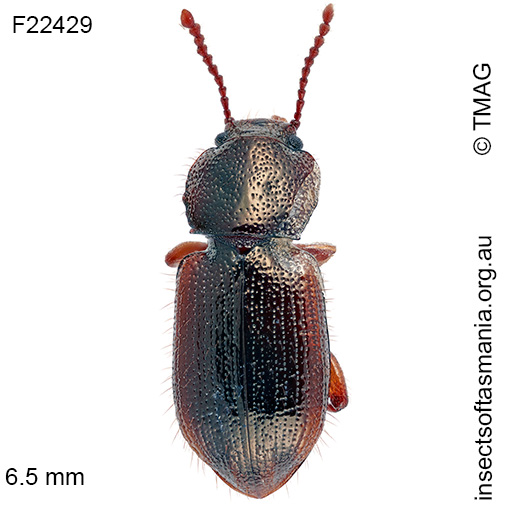
Brycopia picta (a species of darkling-beetle)
Basis for Tasmanian occurrence
TMAG collections
Classification
Suborder: Polyphaga
Superfamily: Tenebrionoidea
Family: Tenebrionidae
Subfamily: Lagriinae
Tribe: Adeliini
Morphology
Typical length (mm): 6.5
Flightedness: functionally flightless
Ecology
Association with dead wood or old trees: obligately saproxylic
Ecological attributes: — Found under large logs (Grove et al., 2006) — May occupy logs or trunks of Eucalyptus obliqua, at least temporarily, since found having emerged within six years of felling (Grove et al., 2009).
Collection method(s) for TMAG material: — Emergence trapping from log of Eucalyptus obliqua — Hand collection (substrate not specified) — Hand collection from under log of Eucalyptus sp. — Log-mounted flight intercept trapping — Pitfall trapping.
Source ecological literature:
Grove, S.J. et al. (2006). What lives under large logs in Tasmanian eucalypt forest? Tas. Nat. 128: 86-93.
Grove, S. et al. (2009). A long-term experimental study of saproxylic beetle … succession in Tasmanian Eucalyptus … logs… In: Fattorini, S. (Ed.), Insect Ecology and Conservation. Research Signpost, pp. 71-114.
Harrison, K.S. (2007). Saproxylic beetles associated with habitat features in Eucalyptus obliqua trees in the southern forests of Tasmania. PhD thesis, Dept. of Zoology, Univ. of Tasmania, Hobart.
Yee, M. (2005). The ecology and habitat requirements of saproxylic beetles native to Tasmanian wet eucalypt forests: potential impacts of commercial forestry practices. PhD thesis, Univ. of Tasmania, Hobart.
, M. et al. (2006). Brown rot in inner heartwood: why large logs support characteristic … beetle assemblages … In Grove, S.J. & Hanula, J.L. (eds.) Insect biodiv. and dead wood, pages 42-56. USDA For. Serv., SRS.

